Published
- 11 min read
Cloud Based Server for Small Business: The Complete 2025 Guide
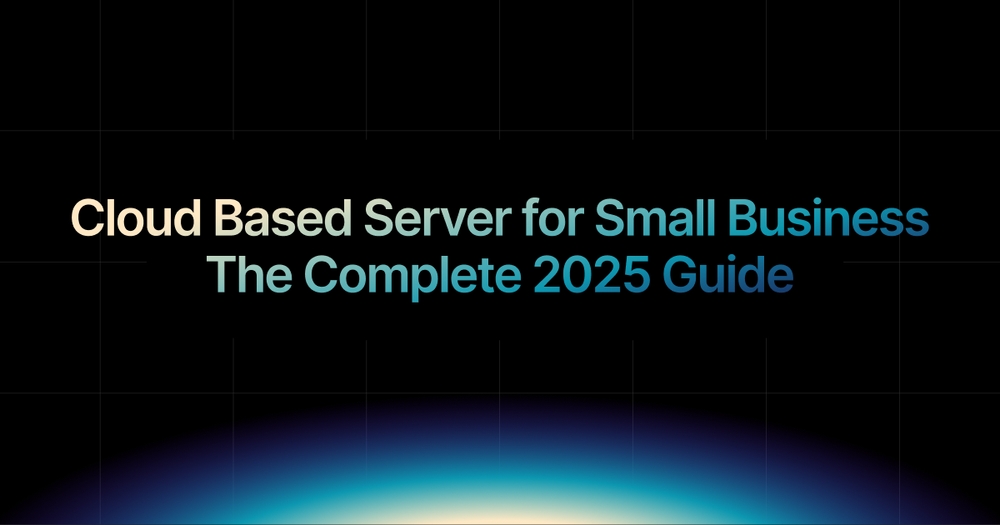
Key Highlights
- Small businesses are rapidly shifting from local servers to cloud based servers for affordability and flexibility.
- Cloud servers eliminate upfront hardware costs and offer pay-as-you-go pricing.
- Common benefits include scalability, security, remote access, and business continuity.
- Kuberns provides up to 40% AWS savings, one-click deployments, and zero DevOps hassle for small teams.
Introduction: Why Small Businesses Are Moving to the Cloud
Running a small business today means handling more than just day to day operations. You need secure data storage, reliable application hosting, and the ability to scale as you grow. Traditional on premise servers are expensive to maintain and require dedicated IT teams. That is why more businesses are switching to cloud based servers.
Kuberns makes this shift practical and affordable for small teams, with AI driven optimization that can cut AWS costs by up to 40%, one click deployment from your repo, built in CI and CD, and unified monitoring, logs, and SSL, so you do not need a separate DevOps setup. For a deeper look at how Kuberns works and why it is simpler than piecing tools together, read our guide, What is Kuberns, the simplest way to build, deploy, and scale full stack apps.
What Is a Cloud Based Server?
A cloud based server is a virtual server that runs on distributed cloud infrastructure instead of being tied to a single physical machine in your office. Unlike traditional on-premise servers that demand heavy upfront investment in hardware and ongoing maintenance, cloud servers give you access to enterprise-grade computing power through a flexible pay-as-you-go or subscription model.
For small businesses, this means you can:
- Host websites and applications without worrying about downtime or expensive hardware upgrades.
- Run databases, APIs, and business software with resources that adjust automatically as demand grows.
- Store and share files securely thanks to built-in redundancy and backup systems.
- Enable remote access for hybrid teams, so employees can work securely from anywhere.
The biggest advantage is flexibility and cost efficiency. Cloud servers can scale up or down instantly, so you only pay for what you use. They are also managed and updated by the provider, which removes the burden of patching, monitoring, and maintaining infrastructure.
This is where modern platforms like Kuberns take things further. Instead of juggling multiple tools for hosting, scaling, and monitoring, Kuberns bundles everything into one AI-powered platform that saves small teams both time and money. Our blog on AI in DevOps and Developer Workflow explains how automation is changing the way businesses approach cloud operations.
For companies exploring alternatives to traditional providers like AWS or Heroku, Kuberns also provides a smarter and more affordable choice. You can see how it compares to major players in our guide to Best AWS Alternatives for High Performance Hosting at Lower Cost.
For a growing small business, this combination of cloud infrastructure and deployment automation means you can enjoy enterprise-level technology, without enterprise-level expenses or DevOps overhead.
Benefits of Cloud Based Servers for Small Businesses
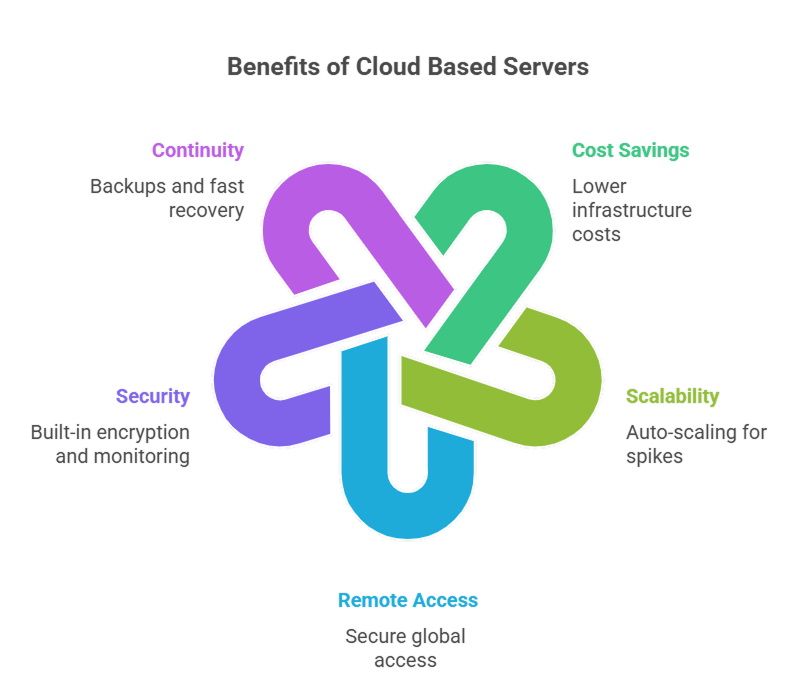
1. Cost Savings
Buying, maintaining, and upgrading on premise servers can drain budgets quickly. Hardware, software, and IT staffing all add up. Cloud servers replace these expenses with predictable, usage based pricing. With Kuberns, small businesses can save even more through AI driven optimisation on AWS backed infrastructure. For practical strategies to keep bills low, see How to Reduce AWS Cost: Practical Steps Every Business Can Use.
2. Easy Scalability
Traffic can spike during festive sales, launches, or seasonal demand. Cloud servers let you scale resources instantly, so you only pay for what you need when you need it. Kuberns streamlines this with built in auto scaling that adjusts capacity as demand changes. For planning smarter scale decisions, read How to Implement Cost Optimisation on AWS for Growing Teams.
3. Remote Accessibility
Hybrid and remote work need secure access to apps and data from anywhere. Cloud servers make this simple, and Kuberns adds a single dashboard for deploys, logs, and monitoring, so distributed teams can ship faster without office bound infrastructure. See how AI is improving developer workflow in AI in DevOps and Developer Workflow: Smarter Software Delivery in 2025.
4. Enhanced Security
Enterprise grade protections like encryption, firewalls, and backups are built into modern cloud platforms. Kuberns layers on centralised monitoring and real time alerts to reduce risk and downtime. For a broader view of how automation strengthens reliability, explore Will AI Replace DevOps Engineers? The Real Answer in 2025.
5. Business Continuity
Hardware failures or local outages should not stop your business. Cloud servers provide redundancy and automated backups, so you can recover quickly. If you are weighing hosting options with performance and resilience in mind, compare choices in Best AWS Alternatives for High Performance Hosting at Lower Cost.
Challenges Small Businesses Face with Cloud Servers
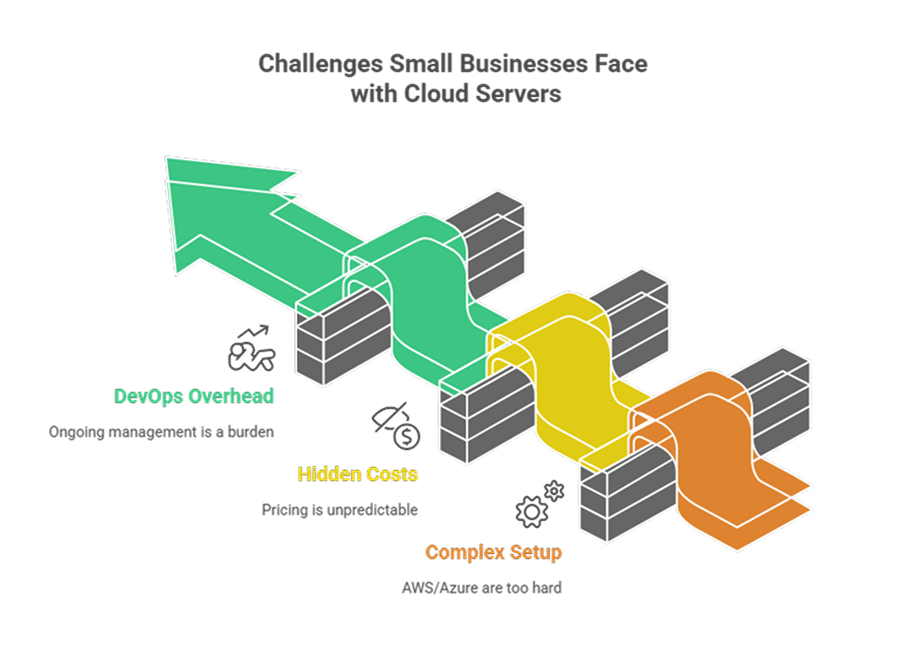 While cloud servers bring undeniable advantages, many small businesses encounter roadblocks that slow down adoption. Understanding these challenges is the first step toward choosing the right solution.
While cloud servers bring undeniable advantages, many small businesses encounter roadblocks that slow down adoption. Understanding these challenges is the first step toward choosing the right solution.
1. Complex Setup
Providers like AWS or Azure are powerful but not built with small businesses in mind. Setting up a server requires knowledge of networking, virtual machines, and container orchestration. For lean teams, this complexity can be overwhelming.
Kuberns removes this barrier with one-click deployments and AI-driven orchestration, so you can get started without DevOps expertise. Our article on Best Auto Deployment Tools in 2025 explains how automation is transforming cloud infrastructure for smaller teams.
2. Hidden Costs
Public cloud pricing models often come with surprises. Beyond the base server cost, you may face extra charges for bandwidth, storage, and monitoring. These unpredictable bills make budgeting difficult for small companies.
Kuberns solves this with transparent pricing and AI-powered optimisation that cuts AWS bills significantly. For more insight on how businesses can control cloud costs, read How to Implement Cost Optimisation on AWS for Growing Teams.
3. DevOps Overhead
Managing deployments, scaling workloads, and monitoring server health requires ongoing attention. Many small businesses do not have the resources to maintain a dedicated DevOps team.
Kuberns integrates CI/CD, monitoring, scaling, and logging into a single platform, which allows you to focus on building products instead of firefighting infrastructure. We cover this shift in our blog on AI in DevOps and Developer Workflow.
Why Kuberns Is the Best Cloud Based Server Option for Small Business
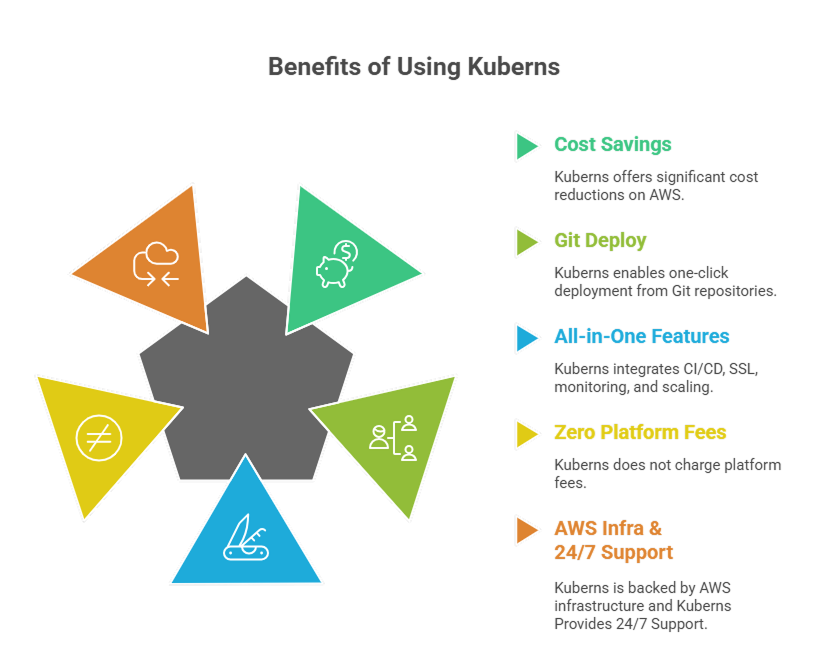 At Kuberns, we designed our platform specifically for startups, freelancers, and small companies. Unlike traditional cloud providers, you do not need to hire a DevOps team or spend weeks learning complex setups. Kuberns removes the friction so you can focus on building your business, not managing infrastructure.
At Kuberns, we designed our platform specifically for startups, freelancers, and small companies. Unlike traditional cloud providers, you do not need to hire a DevOps team or spend weeks learning complex setups. Kuberns removes the friction so you can focus on building your business, not managing infrastructure.
Here is what makes Kuberns stand out:
- Up to 40% AWS cost savings powered by AI-driven optimisation, giving small businesses predictable and lower cloud bills. See how this works in our blog on How AI Optimisation Makes IT Cloud Solutions More Cost-Effective.
- One-click deployment from your Git repo, so developers can go live without DevOps overhead. For a practical perspective, read Best Auto Deployment Tools in 2025.
- All-in-one features: CI/CD, SSL, monitoring, logging, scaling, and domains bundled into one platform, saving time and eliminating the need for multiple vendors.
- Zero platform fees, you only pay for the infrastructure you use. This keeps Kuberns cost-efficient and startup-friendly.
- Responsive support, built for small teams who need clear guidance and quick resolutions instead of generic help desk replies.
By hosting on Kuberns’ AWS-backed infrastructure, you get the performance and reliability of the world’s leading cloud provider, without the complexity, hidden costs, or steep learning curve. For teams exploring their options, our article on Best AWS Alternatives for High Performance Hosting at Lower Cost highlights why Kuberns is often the smarter choice.
How to Get Started with a Cloud Server for Your Business
Getting started with a cloud based server is simpler than ever, especially for small businesses that want to keep costs low and avoid technical complexity. Here is a step by step approach:
1. Choose Your Platform
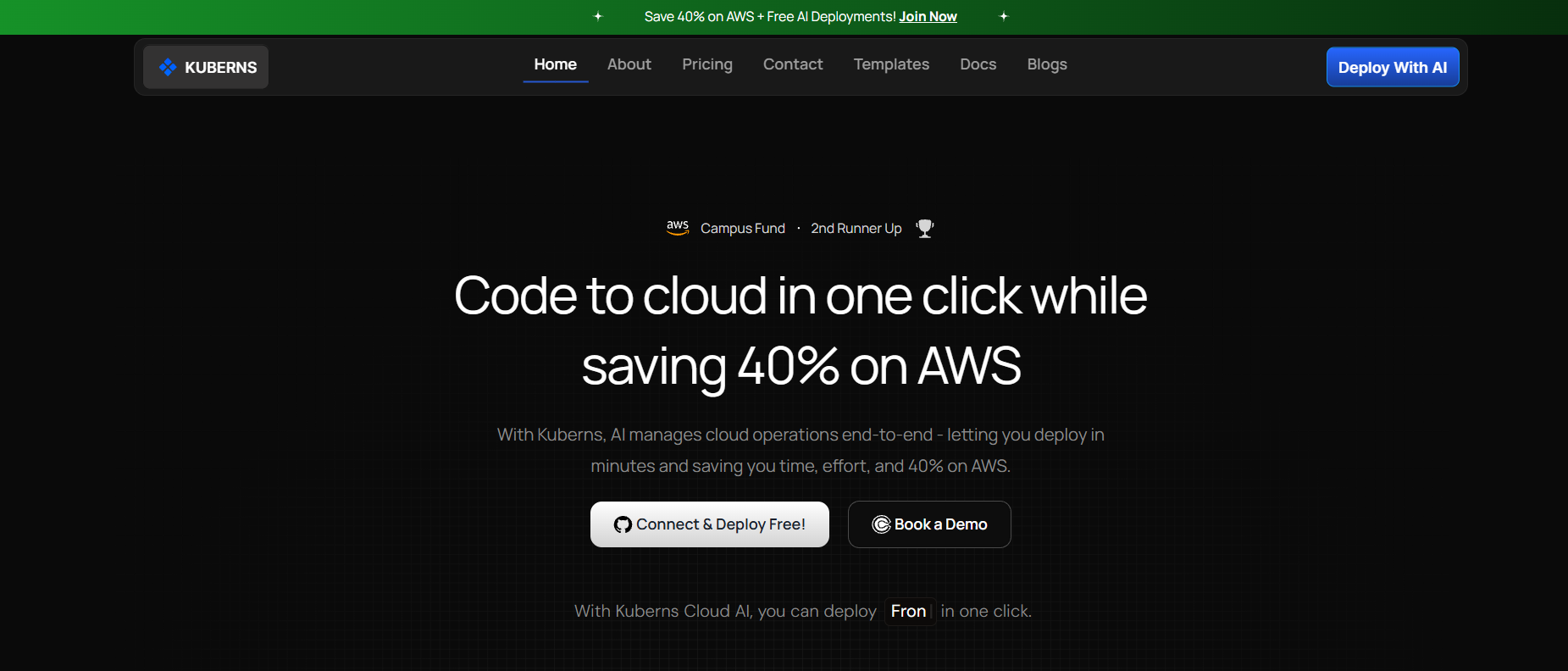 Instead of jumping straight into raw providers like AWS or Azure, which require steep learning curves, consider simplified platforms like Kuberns. Kuberns gives you the same AWS backed power with AI driven optimisation that reduces costs and complexity. If you are evaluating providers, see our guide on Best AWS Alternatives for High Performance Hosting at Lower Cost.
Instead of jumping straight into raw providers like AWS or Azure, which require steep learning curves, consider simplified platforms like Kuberns. Kuberns gives you the same AWS backed power with AI driven optimisation that reduces costs and complexity. If you are evaluating providers, see our guide on Best AWS Alternatives for High Performance Hosting at Lower Cost.
2. Connect Your Code
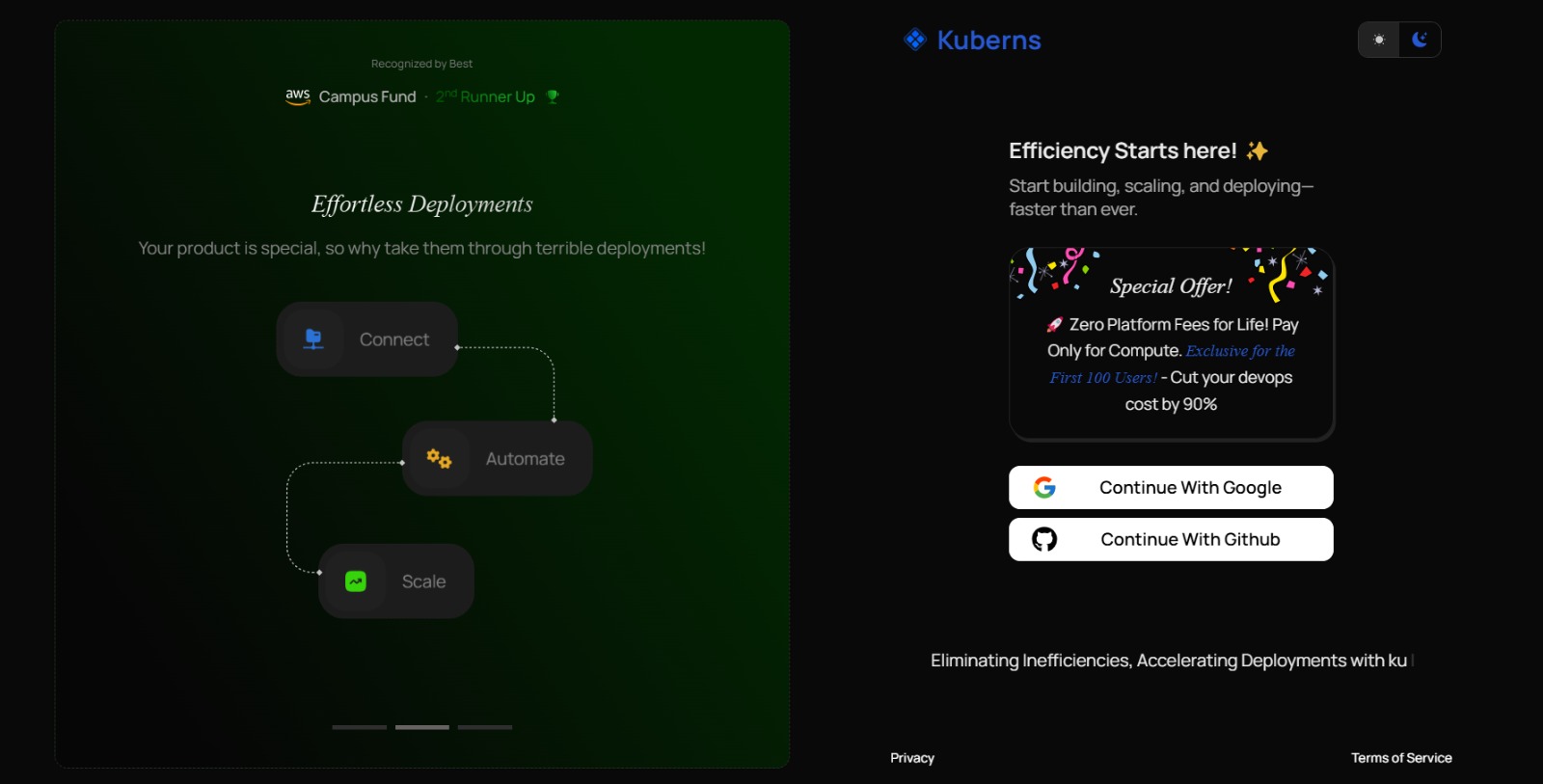 Push your application or website code directly from GitHub, GitLab, or Bitbucket. Kuberns integrates seamlessly with these repositories, so you do not need manual setup or extra tools. This approach is part of the modern deployment workflows covered in AI in DevOps and Developer Workflow.
Push your application or website code directly from GitHub, GitLab, or Bitbucket. Kuberns integrates seamlessly with these repositories, so you do not need manual setup or extra tools. This approach is part of the modern deployment workflows covered in AI in DevOps and Developer Workflow.
3. Deploy in One Click
With Kuberns, you can go live in one click. The platform handles provisioning, scaling, SSL, and security automatically. No DevOps expertise is required, which makes it ideal for small teams that want to move fast. For more on how automated tools simplify deployment, check out Best Auto Deployment Tools in 2025.
4. Monitor and Grow
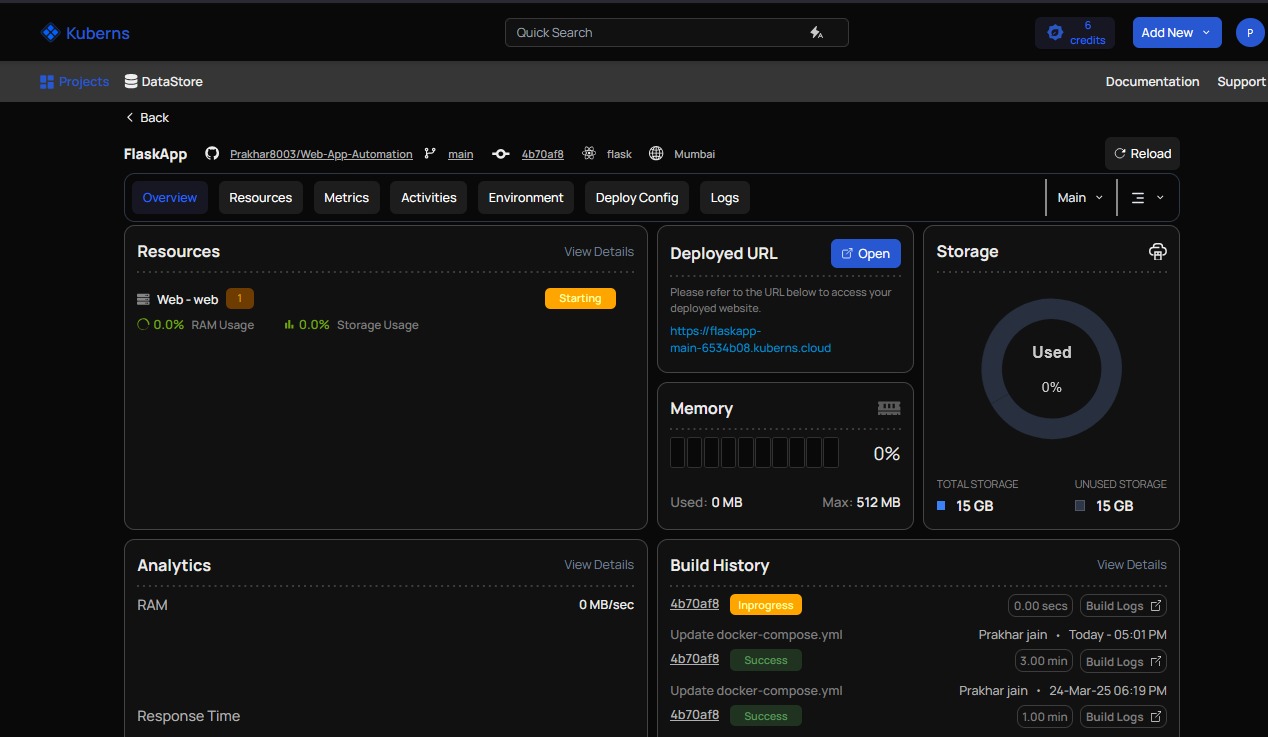 Once your application is live, use the built in monitoring and logging to track performance, spot issues early, and scale as your business grows. Continuous optimisation ensures you stay efficient. Learn more about the future of scaling and automation in our article Will AI Replace DevOps Engineers? The Real Answer in 2025.
Once your application is live, use the built in monitoring and logging to track performance, spot issues early, and scale as your business grows. Continuous optimisation ensures you stay efficient. Learn more about the future of scaling and automation in our article Will AI Replace DevOps Engineers? The Real Answer in 2025.
Conclusion
For small businesses, cloud based servers are now essential. They save money, improve scalability, and reduce IT headaches.
The real decision is not whether to use the cloud, but which platform to trust. Kuberns is built for startups and small teams, offering one click deployments, AI driven cost optimisation with up to 40% AWS savings, and all in one features without the complexity.
👉 Ready to simplify your cloud journey? Visit kuberns.com and start deploying smarter today.

FAQ
What is the best cloud server for small business? Kuberns is ideal for small businesses because it offers AWS-backed hosting with up to 40% savings, simple one-click deployment, and no DevOps complexity.
How much does a cloud server cost for small business? Costs vary by usage. On AWS or Azure, it can be unpredictable. With Kuberns, pricing is transparent and up to 40% cheaper.
Can I migrate from my existing hosting to Kuberns? Yes. Migrating your website or application is simple, and our team provides full guidance.
Is a cloud server secure for small businesses? Yes. Cloud servers come with built-in security features like firewalls, data encryption, and backups. Kuberns enhances this with monitoring and alerts.
Do I need a DevOps team to use a cloud server? Not with Kuberns. Our AI-powered platform manages deployment and scaling for you.